关于儿童算术能力childrens numerical skills_英语作文
孩子是否要学习更多的技能英语作文

孩子是否要学习更多的技能英语作文Children should definitely learn more skills. In today's fast-paced and competitive world, having a diverse set of skills is essential for success. Learning new skills not only broadens a child's knowledge but also helps them develop important qualities such as problem-solving, creativity, and resilience.One important skill that children should learn is English. English is considered the global language of communication and is widely used in business, education, and technology. By learning English, children can open up a world of opportunities for themselves and broaden their horizons. They can easily communicate with people from different cultures, access a wealth of information online, and even study or work abroad.In addition to English, children should also learn practical skills such as coding, cooking, gardening, and financial literacy. Coding is an important skill in today's digital age, and learning to code can help children understand how technology works and develop problem-solving skills. Cooking and gardening are valuable life skills thatcan teach children about nutrition, sustainability, andself-sufficiency. Financial literacy is another crucial skill that children should learn to manage their money wisely and make smart financial decisions.Overall, learning new skills is essential for children's personal and professional development. By acquiring a diverse set of skills, children can become more well-rounded individuals and better prepare themselves for the future.孩子们当然应该学习更多的技能。
英语精选作文合集:儿童数字技术
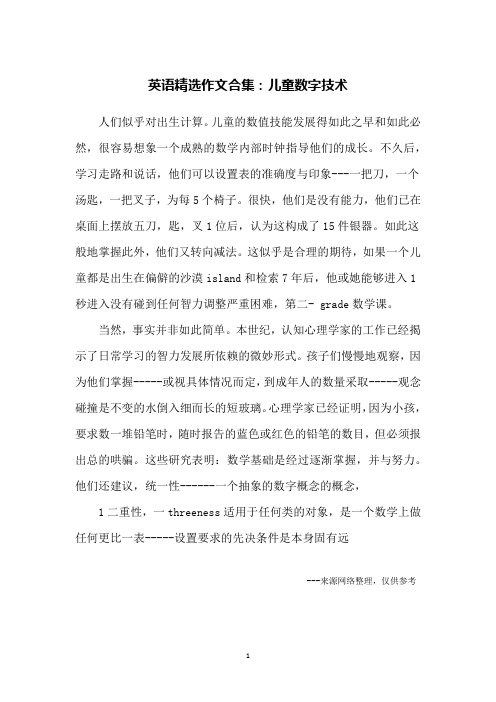
英语精选作文合集:儿童数字技术
人们似乎对出生计算。
儿童的数值技能发展得如此之早和如此必然,很容易想象一个成熟的数学内部时钟指导他们的成长。
不久后,学习走路和说话,他们可以设置表的准确度与印象---一把刀,一个汤匙,一把叉子,为每5个椅子。
很快,他们是没有能力,他们已在桌面上摆放五刀,匙,叉1位后,认为这构成了15件银器。
如此这般地掌握此外,他们又转向减法。
这似乎是合理的期待,如果一个儿童都是出生在偏僻的沙漠island和检索7年后,他或她能够进入1秒进入没有碰到任何智力调整严重困难,第二- grade数学课。
当然,事实并非如此简单。
本世纪,认知心理学家的工作已经揭示了日常学习的智力发展所依赖的微妙形式。
孩子们慢慢地观察,因为他们掌握-----或视具体情况而定,到成年人的数量采取-----观念碰撞是不变的水倒入细而长的短玻璃。
心理学家已经证明,因为小孩,要求数一堆铅笔时,随时报告的蓝色或红色的铅笔的数目,但必须报出总的哄骗。
这些研究表明:数学基础是经过逐渐掌握,并与努力。
他们还建议,统一性------一个抽象的数字概念的概念,1二重性,一threeness适用于任何类的对象,是一个数学上做任何更比一表-----设置要求的先决条件是本身固有远
---来源网络整理,仅供参考
1。
以孩子是否要学习更多的技能英语作文八下

以孩子是否要学习更多的技能英语作文八下Should Children Learn More Skills?In today's fast-paced and competitive world, the question of whether children should learn more skills is a hotly debated topic. Some argue that children should focus on academics and traditional subjects, while others believe that learning a diverse range of skills is crucial for success. In my opinion, I believe that children should be encouraged to learn more skills, as it can greatly benefit them both academically and personally.Firstly, learning more skills can help children develop awell-rounded personality and a wide range of interests. By engaging in activities such as music, sports, art, and language learning, children can discover their passions and talents, which can help them boost their self-esteem and confidence. Moreover, learning different skills can also help children become more creative, innovative, and adaptable, as they are exposed to new ideas and perspectives that can broaden their horizons.Secondly, learning more skills can enhance children's academic performance. Studies have shown that children who participate in extracurricular activities tend to have higher levels of academic achievement, as these activities can improve theircognitive abilities, concentration, and problem-solving skills. For example, playing a musical instrument can enhance a child's mathematical abilities, while learning a new language can improve their memory and language skills.Furthermore, learning more skills can also help children develop important life skills such as teamwork, leadership, time management, and communication skills. By participating in group activities and working with others, children can learn how to collaborate, negotiate, and resolve conflicts, which are essential skills for success in today's interconnected world. Additionally, learning new skills can teach children the value of perseverance, hard work, and dedication, as they face challenges and setbacks while trying to master a new skill.In conclusion, I believe that children should be encouraged to learn more skills, as it can have numerous benefits for their personal and academic development. By engaging in a diverse range of activities, children can discover their passions, enhance their academic performance, and develop important life skills that will serve them well in the future. Therefore, parents, teachers, and society as a whole should support and encourage children to explore and learn new skills, as it can have a positive impact on their overall development and future success.。
数字技能的重要性英语作文

数字技能的重要性英语作文英文回答:The Importance of Numerical Skills.In today's world, numerical skills have become increasingly important. Whether it is in the field of finance, technology, or even everyday life, the ability to understand and work with numbers is crucial. Numerical skills not only allow individuals to make informed decisions, but they also enhance problem-solving abilities and promote logical thinking. In this essay, I will discuss the significance of numerical skills and provide examples to illustrate their importance.To begin with, numerical skills are essential in the field of finance. Whether it is managing personal finances or making investment decisions, having a solid grasp of numbers is crucial. For instance, individuals who possess strong numerical skills can accurately analyze financialstatements, calculate interest rates, and make informed decisions about saving and investing. Without these skills, individuals may fall victim to financial scams or make poor investment choices, leading to financial instability.Furthermore, numerical skills are vital in the technology industry. In today's digital age, technology is constantly evolving, and individuals with strong numerical skills are in high demand. For example, programmers and software developers need to understand complex algorithms and mathematical concepts to create innovative solutions. Additionally, data analysts and scientists rely on numerical skills to analyze large sets of data and draw meaningful conclusions. Without these skills, individuals may struggle to keep up with the rapidly changing technological landscape.In addition to finance and technology, numerical skills are also crucial in everyday life. From calculating expenses to measuring ingredients in a recipe, numerical skills are constantly used in various situations. For instance, individuals with strong numerical skills canaccurately budget their expenses, compare prices to make cost-effective purchases, and understand the implications of interest rates on loans. Moreover, numerical skills enable individuals to interpret data and statistics, allowing them to make informed decisions in their personal and professional lives.In conclusion, numerical skills play a vital role in today's society. From finance to technology and everyday life, the ability to work with numbers is essential. Without these skills, individuals may face financial instability, struggle to keep up with technological advancements, and make uninformed decisions. Therefore, it is crucial to develop and enhance numerical skills to thrive in the modern world.中文回答:数字技能的重要性。
孩子们是否应该学习更多的技能英语作文

The Necessity of Enriching Children's Skillset In today's rapidly evolving world, the question of whether children should learn more skills has become increasingly pertinent. With technology advancing at an unprecedented rate and the job market constantly shifting,it's crucial that our younger generation possesses adiverse skillset to navigate the complexities of the future. Firstly, learning multiple skills equips children with adaptability. As the world becomes more interconnected and competitive, the ability to adapt to changing environments and circumstances is paramount. By acquiring a wide rangeof skills, children become more resilient and versatile, able to pivot when faced with new challenges or opportunities.Secondly, multiple skills enhance children's problem-solving abilities. In the modern world, problems often require interdisciplinary approaches. By having a broad skillset, children are able to draw from various perspectives and techniques to find innovative solutions. This cross-pollination of ideas and methods fosterscreativity and innovation, vital qualities in today's knowledge-based economy.Moreover, learning more skills prepares children for a future where job roles and responsibilities are becoming increasingly blurred. With the rise of the gig economy and remote work, individuals are expected to wear multiple hats and perform a variety of tasks. By acquiring multiple skills, children are better prepared to take on these evolving roles and seize the opportunities they present.Additionally, learning more skills instills a sense of confidence and accomplishment in children. As they master new skills, they gain a sense of agency and autonomy, knowing that they have the ability to learn and grow. This confidence boosts their motivation to continue learning and exploring, leading to a lifelong love of learning.However, it's important to strike a balance. While it's beneficial for children to learn multiple skills, it's crucial that they are given the opportunity to focus on their interests and passions. Overloading them with too many activities or classes can lead to stress and burnout, affecting their overall well-being. It's essential toencourage children to explore different areas, but also to allow them to pursue their own interests and develop their unique talents.In conclusion, learning more skills is beneficial for children in numerous ways. It equips them with adaptability, problem-solving abilities, and a sense of confidence and accomplishment. As we prepare our children for the future,it's important to cultivate a mindset of continuouslearning and exploration, encouraging them to acquire a diverse skillset that will serve them well in theirpersonal and professional lives.**丰富孩子们的技能集的必要性**在当今快速发展的世界中,孩子们是否应该学习更多技能的问题变得越来越重要。
2020年英语六级考试口语练习(1):儿童的数学能力
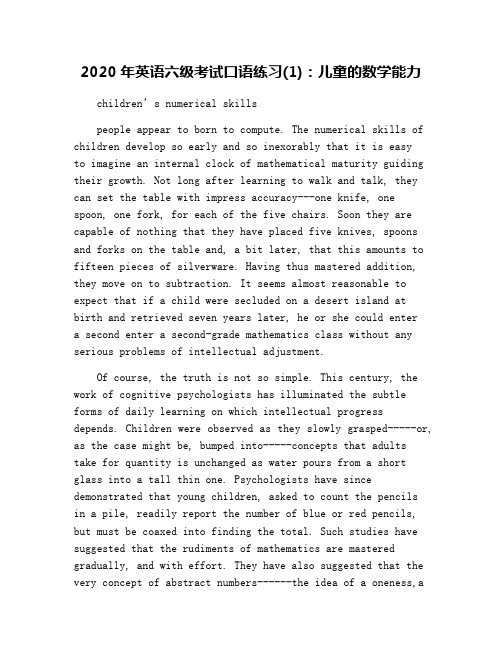
2020年英语六级考试口语练习(1):儿童的数学能力children’s numerical skillspeople appear to born to compute. The numerical skills of children develop so early and so inexorably that it is easyto imagine an internal clock of mathematical maturity guiding their growth. Not long after learning to walk and talk, they can set the table with impress accuracy---one knife, one spoon, one fork, for each of the five chairs. Soon they are capable of nothing that they have placed five knives, spoons and forks on the table and, a bit later, that this amounts to fifteen pieces of silverware. Having thus mastered addition, they move on to subtraction. It seems almost reasonable to expect that if a child were secluded on a desert island atbirth and retrieved seven years later, he or she could entera second enter a second-grade mathematics class without any serious problems of intellectual adjustment.Of course, the truth is not so simple. This century, the work of cognitive psychologists has illuminated the subtle forms of daily learning on which intellectual progress depends. Children were observed as they slowly grasped-----or, as the case might be, bumped into-----concepts that adultstake for quantity is unchanged as water pours from a short glass into a tall thin one. Psychologists have since demonstrated that young children, asked to count the pencilsin a pile, readily report the number of blue or red pencils, but must be coaxed into finding the total. Such studies have suggested that the rudiments of mathematics are mastered gradually, and with effort. They have also suggested that the very concept of abstract numbers------the idea of a oneness,atwoness , a threeness that applies to any class of objects and is a prerequisite for doing anything more mathematically demanding than setting a table-----is itself far from innate。
关于学生数字技能的英语作文

关于学生数字技能的英语作文The Importance of Digital Skills for Students in the 21st CenturyIn today's rapidly evolving digital landscape, the possession of strong digital skills has become increasingly crucial for students to succeed both in their academic pursuits and in their future careers. The integration of technology into nearly every aspect of our lives has created a growing demand for individuals who can effectively navigate and utilize digital tools and resources. As the world becomes more interconnected and data-driven, the development of digital skills among students has become a paramount concern for educators, policymakers, and employers alike.One of the primary reasons why digital skills are so essential for students is the ubiquity of technology in the modern classroom. From online learning platforms and educational software to virtual collaboration tools and digital research resources, technology has become an integral part of the learning experience. Students who possess a solid understanding of how to use these digital tools are better equipped to engage with course materials, collaborate withtheir peers, and access a wealth of information to support their academic endeavors. Additionally, the ability to effectively navigate and utilize digital platforms can enhance students' productivity, organization, and time management skills, all of which are crucial for academic success.Moreover, the importance of digital skills extends beyond the classroom and into the workforce. As the job market continues to evolve, employers are increasingly seeking individuals who can demonstrate proficiency in a range of digital skills, such as data analysis, programming, web design, and digital marketing. By developing these skills, students can position themselves as valuable assets in the job market, increasing their employability and earning potential. Furthermore, many industries are undergoing rapid digital transformations, making it essential for workers to be able to adapt to new technologies and continuously learn new digital skills throughout their careers.In addition to the practical benefits of digital skills, the development of these competencies can also have a profound impact on students' overall cognitive and social development. The ability to critically analyze and evaluate digital information, to effectively communicate and collaborate online, and to understand the ethical implications of digital technologies can all contribute to the cultivation of essential 21st-century skills, such as critical thinking, problem-solving, anddigital citizenship.As students navigate an increasingly complex and technology-driven world, the need for comprehensive digital literacy programs has become paramount. These programs should aim to equip students with a diverse range of digital skills, including but not limited to:1. Digital Literacy: The ability to effectively access, evaluate, and utilize digital information and resources.2. Digital Communication and Collaboration: The skills necessary to communicate, share, and work effectively with others in digital environments.3. Digital Content Creation: The capacity to create, edit, and publish digital content, such as documents, presentations, and multimedia.4. Digital Problem-Solving: The ability to use digital tools and technologies to identify, analyze, and solve problems.5. Cybersecurity and Digital Ethics: An understanding of online safety, privacy, and the ethical implications of digital technologies.By investing in the development of these digital skills, educational institutions can empower students to become active and responsible participants in the digital world, better prepared to navigate the challenges and opportunities that lie ahead.Furthermore, the integration of digital skills into the curriculumshould not be limited to specialized technology courses. Instead, it should be woven throughout the entire educational experience, with opportunities for students to apply and practice their digital skills across various subject areas. This holistic approach to digital skill development can help ensure that students are able to transfer and apply their knowledge and abilities in a wide range of contexts, both academic and professional.In conclusion, the importance of digital skills for students in the 21st century cannot be overstated. As technology continues to shape and transform nearly every aspect of our lives, the ability to effectively navigate and utilize digital tools and resources has become a critical component of academic and professional success. By prioritizing the development of comprehensive digital literacy programs and integrating digital skill-building across the curriculum, educational institutions can empower students to become confident, adaptable, and innovative digital citizens, poised to thrive in the ever-evolving digital landscape.。
小孩应当学习电脑吗 英语作文
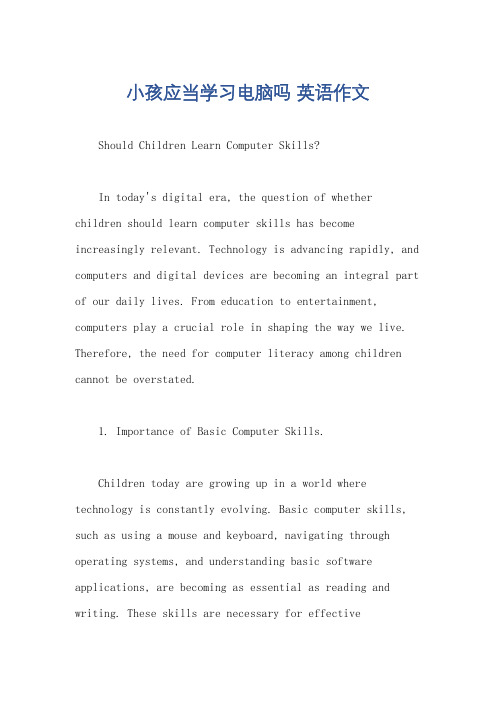
小孩应当学习电脑吗英语作文Should Children Learn Computer Skills?In today's digital era, the question of whetherchildren should learn computer skills has become increasingly relevant. Technology is advancing rapidly, and computers and digital devices are becoming an integral part of our daily lives. From education to entertainment, computers play a crucial role in shaping the way we live. Therefore, the need for computer literacy among children cannot be overstated.1. Importance of Basic Computer Skills.Children today are growing up in a world where technology is constantly evolving. Basic computer skills, such as using a mouse and keyboard, navigating through operating systems, and understanding basic software applications, are becoming as essential as reading and writing. These skills are necessary for effectivecommunication, problem-solving, and critical thinking.2. Educational Benefits.Computers can be a powerful tool for education. They provide access to a wealth of information and resourcesthat can enhance learning in various subjects. Children can use computers to explore topics that interest them, conduct research, and create multimedia projects that engage their imaginations. Additionally, computer-based educational games and programs can make learning more interactive and fun.3. Preparing for the Future.The job market is rapidly changing, and many industries are becoming increasingly reliant on technology. Children who grow up with a strong foundation in computer skillswill be better prepared to compete in the global economy. They will have more opportunities to pursue careers in fields such as computer science, engineering, and technology-related industries.4. Development of Cognitive Skills.Computers can also help develop cognitive skills suchas problem-solving, logic, and decision-making. Programming, for example, is a great way to introduce children to these concepts. It requires them to think creatively and analytically to solve problems. Such skills are not only valuable in the computer world but also in real-life situations.5. Social Aspects.Computers and the internet have transformed the way we socialize. Children can use computers to stay connectedwith friends and family, share their experiences, and learn about different cultures and perspectives. Social media and online communities provide platforms for children toexpress themselves and develop their sense of belonging.6. Safety Concerns.However, while computers offer numerous benefits, there are also safety concerns that need to be addressed. Children need to be educated about internet safety, including protecting their personal information, avoiding inappropriate content, and recognizing online scams and bullying. Parents and educators play a crucial role in monitoring and guiding children's online activities.7. Balanced Approach.It is important to strike a balance between technology use and other activities. Children need to engage in physical activities, social interactions, and other non-screen-based activities to promote their overall development. Technology should be used as a tool to enhance learning and entertainment, not as a replacement for other important aspects of childhood.In conclusion, children should indeed learn computer skills. These skills are not only essential for success in today's digital world but also for personal growth and development. However, it is crucial to approach technologyeducation with a balanced perspective, ensuring that children are not overwhelmed by it and that they have opportunities to engage in other valuable activities. By doing so, we can help children become responsible and competent users of technology, ready to take on the challenges of the future.。
珠算文化介绍英文作文

珠算文化介绍英文作文英文:As a Chinese person, I am proud of our country's rich history and culture. One aspect of our culture that I find particularly fascinating is the art of abacus calculation, also known as zhūsuàn (珠算).The abacus is a counting tool that has been used in China for over 2,000 years. It consists of a frame with beads that can be moved up and down on rods. Each bead hasa specific value, and by manipulating the beads, one can perform addition, subtraction, multiplication, and division.Zhūsuàn was once an essential skill for merchants, bankers, and government officials in China. It was alsoused in schools as a way to teach math. Today, while the abacus has been largely replaced by electronic calculators, zhūsuàn is still taught in some schools and is considered a valuable skill to have.One of the reasons I find zhūsuàn so fascinating is the speed and accuracy with which practitioners can perform calculations. Watching someone skilled in zhūsuàn work is like watching a magician perform a trick. They move the beads with lightning-fast speed, and the answer seems to appear out of nowhere.Another reason I appreciate zhūsuàn is the mental math skills it helps develop. Practicing zhūsuàn require s a great deal of concentration and mental agility. It also helps develop a strong sense of number sense and a deep understanding of mathematical concepts.In conclusion, I believe that zhūsuàn is an important part of Chinese culture that deserves recognition and appreciation. While it may not be as widely used as it once was, it still holds value as a way to develop mental math skills and as a testament to the ingenuity and creativity of the Chinese people.中文:作为一个中国人,我为我们国家丰富的历史和文化感到自豪。
儿童计谋英语作文

儿童计谋英语作文In the realm of childhood, where imagination and creativity run wild, children often devise their own strategies to achieve their goals. Here is an English composition that captures the essence of a child's cunning plan:Once upon a time, in a small town where the sun always shone bright, there lived a young boy named Timmy. Timmy had a treasure trove of toys, but his favorite was a red fire truck that he had received on his last birthday. One fateful day, while Timmy was playing in the park, he noticed that his fire truck was missing from his toy box.Timmy's heart sank as he thought about his beloved toy. He knew he had to find it, and so he devised a plan. He decided to enlist the help of his friends, who were all members of the "Toy Detectives Club," a group they had formed to solve mysteries and help each other.First, Timmy gathered his friends for a meeting. He explained the situation and asked for their help. Each friend had a special skill: one was good at tracking, another was a master of disguise, and the third had a knack for solving puzzles.They began their investigation by retracing Timmy's steps.They asked other children in the park if they had seenanything unusual. The tracking expert followed the faintwheel tracks left by the fire truck, which led them to a nearby playground.There, they found a clue—a small piece of red paint on a bench. The master of disguise disguised himself as a park worker and asked around, only to find out that a group ofolder kids had been seen playing with a red fire truckearlier that day.The puzzle solver then put together the pieces of information and deduced that the older kids had taken the fire truck to their hideout. The "Toy Detectives Club" followed the cluesto a secret fort in the woods.With their hearts pounding, they approached the fort, readyto confront the older kids. But instead of a confrontation, Timmy decided to use his wit. He proposed a trade: his most prized remote-controlled car for the fire truck.The older kids, seeing the value in the remote-controlled car, agreed to the trade. Timmy got his fire truck back, and the "Toy Detectives Club" celebrated their success with a grand feast of ice cream and cookies.In the end, Timmy learned that sometimes the best strategyisn't always about force, but about clever negotiation and understanding the value of what others hold dear.This composition illustrates a child's clever plan to retrieve a cherished toy, showcasing the importance of teamwork, strategy, and negotiation.。
小时候爸妈教识数字英语作文
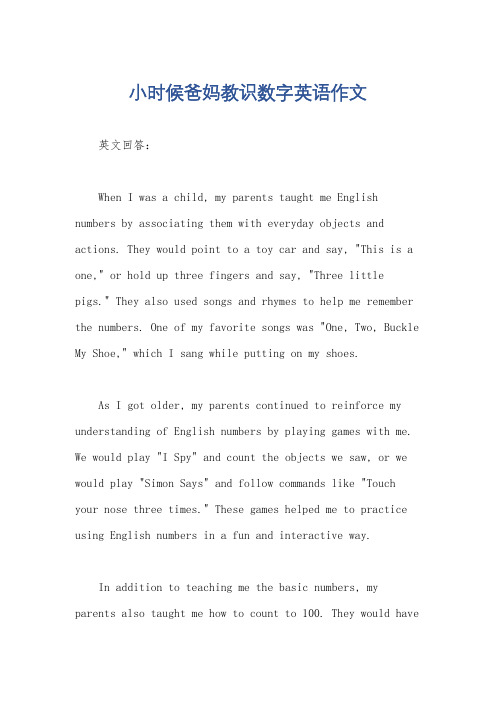
小时候爸妈教识数字英语作文英文回答:When I was a child, my parents taught me English numbers by associating them with everyday objects and actions. They would point to a toy car and say, "This is a one," or hold up three fingers and say, "Three little pigs." They also used songs and rhymes to help me remember the numbers. One of my favorite songs was "One, Two, Buckle My Shoe," which I sang while putting on my shoes.As I got older, my parents continued to reinforce my understanding of English numbers by playing games with me. We would play "I Spy" and count the objects we saw, or we would play "Simon Says" and follow commands like "Touch your nose three times." These games helped me to practice using English numbers in a fun and interactive way.In addition to teaching me the basic numbers, my parents also taught me how to count to 100. They would haveme count the steps as we walked up the stairs, or theywould have me count the cars as we drove down the street. They also taught me how to read and write numbers, which helped me to develop my overall numeracy skills.Thanks to my parents' patient and engaging teaching methods, I was able to learn English numbers quickly and easily. I am grateful for their help in laying the foundation for my mathematical understanding.中文回答:小时候,爸爸妈妈通过将英语数字与日常物品和动作联系起来,教会了我英语数字。
孩子们是否应该学习更多的技能英语作文
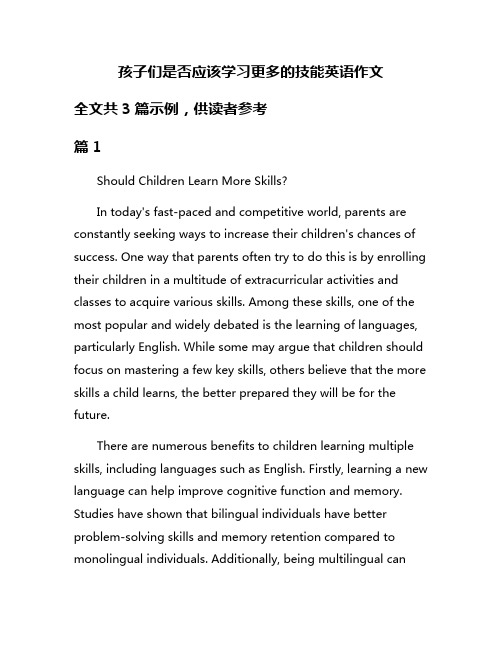
孩子们是否应该学习更多的技能英语作文全文共3篇示例,供读者参考篇1Should Children Learn More Skills?In today's fast-paced and competitive world, parents are constantly seeking ways to increase their children's chances of success. One way that parents often try to do this is by enrolling their children in a multitude of extracurricular activities and classes to acquire various skills. Among these skills, one of the most popular and widely debated is the learning of languages, particularly English. While some may argue that children should focus on mastering a few key skills, others believe that the more skills a child learns, the better prepared they will be for the future.There are numerous benefits to children learning multiple skills, including languages such as English. Firstly, learning a new language can help improve cognitive function and memory. Studies have shown that bilingual individuals have better problem-solving skills and memory retention compared to monolingual individuals. Additionally, being multilingual canincrease a child's cultural awareness and empathy towards others, as they have a better understanding of different languages and cultures. In a globalized world, being able to communicate effectively with people from different backgrounds is a valuable skill.Furthermore, learning English, in particular, can greatly benefit children in their future academic and professional pursuits. English is widely considered the international language of business, science, and diplomacy. Knowing English can open up a world of opportunities for children, as many universities and employers require proficiency in the language. By mastering English at a young age, children can gain a competitive edge in the job market and have a greater chance of success in their careers.On the other hand, some may argue that children should focus on mastering a few key skills rather than being spread too thin. They believe that by trying to learn too many things at once, children may not be able to excel in any one area. For example, if a child is constantly attending different classes and extracurricular activities, they may not have enough time to truly master a particular skill or subject. This can lead to feelings offrustration and burnout, as the child may struggle to keep up with their numerous commitments.While it is important for children to have a well-rounded education and exposure to different skills, it is equally important for parents to consider their child's individual interests and abilities. Not every child may thrive in a multitude of activities, and it is important to strike a balance between learning new skills and allowing the child to excel in their areas of passion. Additionally, parents should ensure that their child's schedule is not overly packed with activities, as this can lead to stress and exhaustion.In conclusion, while learning new skills, including languages such as English, can greatly benefit children in various aspects of their lives, it is important for parents to consider their child's individual needs and abilities. Children should be encouraged to explore their interests and passions, while also being exposed to a variety of skills that can help them succeed in the future. By striking a balance between learning new skills and allowing the child to excel in their areas of passion, parents can help set their children up for success in today's competitive world.篇2Should children learn more skills?In today's fast-paced and ever-changing world, the question of whether children should learn more skills is becoming more and more relevant. On one hand, some argue that children already have a lot to deal with in terms of schoolwork and extracurricular activities, while on the other hand, there are those who believe that children could benefit greatly from learning more skills. In this essay, we will explore the benefits of children learning additional skills and discuss why it is important for their personal and professional development.First and foremost, learning new skills can help children to develop a wide range of abilities, such as problem-solving, critical thinking, creativity, and communication. These skills are not only important for academic success but are also essential for success in the workplace. In today's digital age, where technology is constantly evolving, it is crucial for children to be adaptable and able to learn new skills quickly. By exposing children to a variety of activities and experiences, they can develop a growth mindset and become more resilient individuals.Furthermore, learning new skills can help children to discover their passions and interests. By trying out differentactivities, children can find out what they enjoy and what they are good at. This can help them to build their self-confidence and self-esteem, as well as develop a sense of purpose and direction in life. By exploring different hobbies and interests, children can also develop a sense of independence and autonomy, as they learn to make decisions for themselves and take responsibility for their own learning.In addition, learning new skills can help children to become more well-rounded individuals. By exposing children to a diverse range of activities, they can develop a greater appreciation for the world around them and gain a broader perspective on life. For example, by learning a musical instrument or taking up a sport, children can develop a greater appreciation for the arts and physical activity. By studying a foreign language or learning about different cultures, children can develop a greater understanding and empathy for people from different backgrounds.In conclusion, there are many benefits to children learning more skills. By developing a wide range of abilities, discovering their passions and interests, and becoming more well-rounded individuals, children can enhance their personal and professional development. Therefore, it is important for parents, teachers,and policymakers to encourage children to explore new activities and experiences, in order to help them reach their full potential and succeed in life.篇3Should Children Learn More Skills?In the fast-paced and constantly evolving world we live in today, the importance of acquiring a wide range of skills cannot be overstated. Especially for children, who are the future of our society, it is crucial to equip them with the necessary skills that will enable them to succeed in various aspects of life. One of the most valuable skills that children should consider learning is English.English is often referred to as the “global language” because of its widespread use around the w orld. In today’s interconnected world, being proficient in English can open up a world of opportunities for children. From communication and collaboration to education and career advancement, the benefits of learning English are vast and profound.Firs t and foremost, learning English can enhance children’s communication skills. As the most widely spoken language in the world, English acts as a common language that connects peoplefrom different countries and cultures. By learning English, children can effectively communicate with people from diverse backgrounds, fostering cross-cultural understanding and collaboration. This will not only help children in their personal relationships but also prepare them for success in an increasingly globalized world.Furthermore, mastering English can greatly benefit children’s education. Many of the world’s top universities and educational institutions teach in English, and having a strong command of the language can significantly enhance children’s academic performance. Additionally, a large amount of educational resources, such as books, research papers, and online courses, are available in English. By learning English, children can access a wealth of information and knowledge that can enrich their learning experience and broaden their horizons.In terms of career opportunities, being proficient in English can give children a competitive edge in the job market. Many multinational companies and organizations require employees who are proficient in English, as it is often the language of business. By mastering English, children can increase their employment prospects and open up a wider range of career opportunities both at home and abroad.While there are undoubtedly many benefits to learning English, some may argue that children should focus on other skills instead. For example, some may argue that children should prioritize learning technical skills such as coding, engineering, or graphic design, which are in high demand in today’s digital age. Others may argue that children should focus on developing soft skills such as creativity, critical thinking, and emotional intelligence, which are essential for success in a rapidly changing world.While it is important for children to develop a diverse set of skills, including technical and soft skills, learning English should not be overlooked. In fact, learning English can complement and enhance children’s acquisition of other skills. For example, English can help children access online resources and educational materials related to technical skills, or improve their communication skills and emotional intelligence through interactions with people from different cultural backgrounds.In conclusion, children should undoubtedly learn more skills, including English. In a world that is becoming increasingly interconnected and competitive, being proficient in English can give children a significant advantage in various aspects of life. By mastering English, children can enhance their communicationskills, expand their educational opportunities, and increase their career prospects. Ultimately, learning English can empower children to succeed in a globalized world and fulfill their potential as active and engaged members of society.。
孩子不应该学习太多技能英语作文
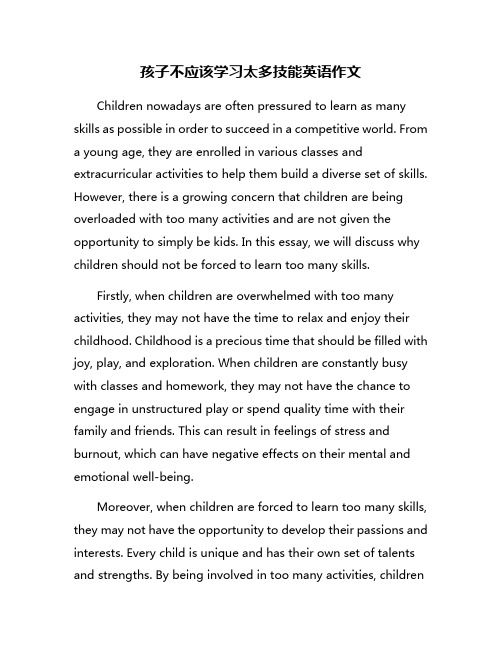
孩子不应该学习太多技能英语作文Children nowadays are often pressured to learn as many skills as possible in order to succeed in a competitive world. From a young age, they are enrolled in various classes and extracurricular activities to help them build a diverse set of skills. However, there is a growing concern that children are being overloaded with too many activities and are not given the opportunity to simply be kids. In this essay, we will discuss why children should not be forced to learn too many skills.Firstly, when children are overwhelmed with too many activities, they may not have the time to relax and enjoy their childhood. Childhood is a precious time that should be filled with joy, play, and exploration. When children are constantly busy with classes and homework, they may not have the chance to engage in unstructured play or spend quality time with their family and friends. This can result in feelings of stress and burnout, which can have negative effects on their mental and emotional well-being.Moreover, when children are forced to learn too many skills, they may not have the opportunity to develop their passions and interests. Every child is unique and has their own set of talents and strengths. By being involved in too many activities, childrenmay not have the chance to explore their interests and discover what they are truly passionate about. This can lead to a lack of motivation and purpose in their pursuits, as they are simply going through the motions of learning various skills without a genuine interest in them.Additionally, learning too many skills at a young age can also have negative effects on children's physical health. With so many classes and activities to attend, children may not have enough time to engage in physical exercise or get enough rest. This can lead to fatigue, poor concentration, and a weakened immune system. It is important for children to have a balanced lifestyle that includes both mental and physical activities in order to stay healthy and fit.Furthermore, the pressure to learn too many skills at a young age can also result in a lack of social interaction and emotional development. Children need time to socialize, develop friendships, and learn important social skills such as communication, empathy, and cooperation. When they are constantly busy with classes and activities, they may not have the chance to form meaningful relationships with their peers and adults. This can hinder their social and emotional development, leading to feelings of loneliness and isolation.In conclusion, while it is important for children to learn new skills and broaden their horizons, it is equally important for them to have a balanced and fulfilling childhood. Children should not be overloaded with too many activities and pressured to excel in multiple areas. Instead, they should be encouraged to explore their interests, develop their passions, and enjoy their childhood to the fullest. By striking a balance between learning and play, children can grow into well-rounded individuals who are happy, healthy, and successful in all aspects of their lives.。
以孩子是否要学习更多的技能英语作文
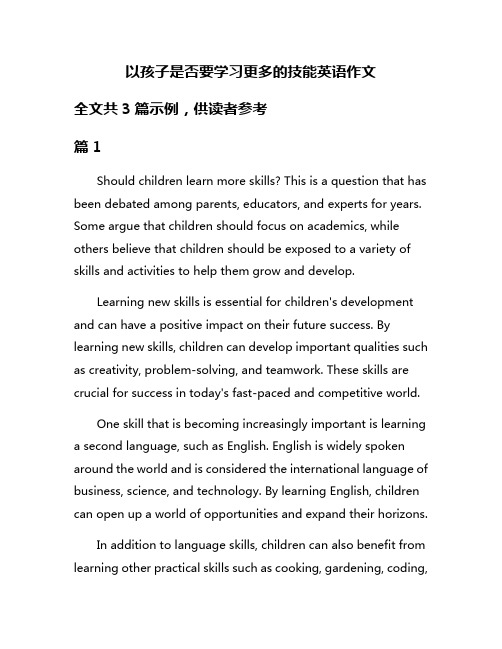
以孩子是否要学习更多的技能英语作文全文共3篇示例,供读者参考篇1Should children learn more skills? This is a question that has been debated among parents, educators, and experts for years. Some argue that children should focus on academics, while others believe that children should be exposed to a variety of skills and activities to help them grow and develop.Learning new skills is essential for children's development and can have a positive impact on their future success. By learning new skills, children can develop important qualities such as creativity, problem-solving, and teamwork. These skills are crucial for success in today's fast-paced and competitive world.One skill that is becoming increasingly important is learning a second language, such as English. English is widely spoken around the world and is considered the international language of business, science, and technology. By learning English, children can open up a world of opportunities and expand their horizons.In addition to language skills, children can also benefit from learning other practical skills such as cooking, gardening, coding,or playing a musical instrument. These skills not only provide children with valuable knowledge but can also boost their confidence and self-esteem.However, it is important for parents and educators to strike a balance between academics and skills-based learning. While learning new skills is important, children should not neglect their academic studies. Education is the foundation for success, and children should always prioritize their academic learning.In conclusion, children should be encouraged to learn more skills to help them grow and develop. Learning new skills can benefit children in many ways and set them up for success in the future. By providing children with a well-rounded education that includes both academics and skills-based learning, we can help them reach their full potential and thrive in today's competitive world.篇2Should Children Learn More Skills?In today's fast-paced and competitive world, the question of whether children should learn more skills has become a topic of debate. Some argue that children already have a lot on their plate with schoolwork and extracurricular activities, while othersbelieve that acquiring additional skills is crucial for their future success. In this essay, we will explore both sides of the argument and provide some insights into why learning more skills can be beneficial for children.On one hand, some believe that children should focus on their academic studies and develop a strong foundation in subjects like math, science, and language arts. They argue that children already have a full schedule with schoolwork, homework, and exams, and adding more skills to the mix could overwhelm them. Moreover, they believe that mastering core academic subjects is essential for children's intellectual development and future success in college and career.On the other hand, there are those who advocate for children to learn more skills beyond what is taught in school. They argue that in today's competitive job market, having a diverse set of skills can give children a competitive edge and open up more opportunities for them in the future. Skills like coding, public speaking, financial literacy, and foreign languages are becoming increasingly important in the workforce, and children who possess these skills will be better equipped to navigate the challenges of the future.Furthermore, learning new skills can also help children develop important life skills such as problem-solving, critical thinking, creativity, and teamwork. These skills are not only valuable in the workplace but also in everyday life, helping children build resilience, confidence, and adaptability. By exposing children to a variety of skills and experiences, parents and educators can help them discover their passions and talents, and develop a well-rounded personality.In conclusion, while it is important for children to focus on their academic studies, learning more skills can also be beneficial for their personal growth and future success. By striking a balance between academic subjects and extracurricular activities, children can develop a diverse set of skills that will serve them well in the future. As parents and educators, it is our responsibility to provide children with opportunities to explore new skills and interests, and help them become well-rounded individuals who are prepared for the challenges of tomorrow.篇3Should children learn more skills beyond academics? This is a question that has been debated for years among parents, educators, and psychologists. Some argue that children should focus solely on their academic studies in order to excel in schooland secure a successful future. Others believe that children should be exposed to a variety of skills and activities in order to develop a well-rounded personality and have a more fulfilling life.I believe that children should learn more skills beyond academics for several reasons. Firstly, learning a variety of skills helps children discover their interests and passions. By trying out different activities such as sports, music, art, and coding, children can explore what they enjoy and what they excel in. This can lead to greater self-awareness and confidence in their abilities. Additionally, acquiring skills outside of academics can enhance a child's creativity and problem-solving abilities. Engaging in hands-on activities and projects can stimulate the brain in different ways and develop important cognitive skills that are not necessarily taught in the classroom.Furthermore, learning new skills can also help children develop important social and emotional skills. Working in teams, collaborating with others, and receiving constructive feedback are valuable experiences that can help children build strong communication and interpersonal skills. These skills are essential for success in the workplace and in building strong relationships.In today's fast-paced and competitive world, having a diverse set of skills can also open up more opportunities for children in the future. In a rapidly changing job market, employers are increasingly looking for candidates who have a wide range of skills and abilities. By equipping children with a variety of skills, they will be better prepared to navigate the challenges of the future and adapt to new opportunities.In conclusion, while academics are important for a child's education, I believe that children should also be encouraged to learn more skills beyond their school curriculum. By exposing children to a variety of activities and experiences, we can help them discover their strengths, develop important life skills, and prepare them for a bright and successful future.。
孩子们是否应该学习更多的技能英语作文
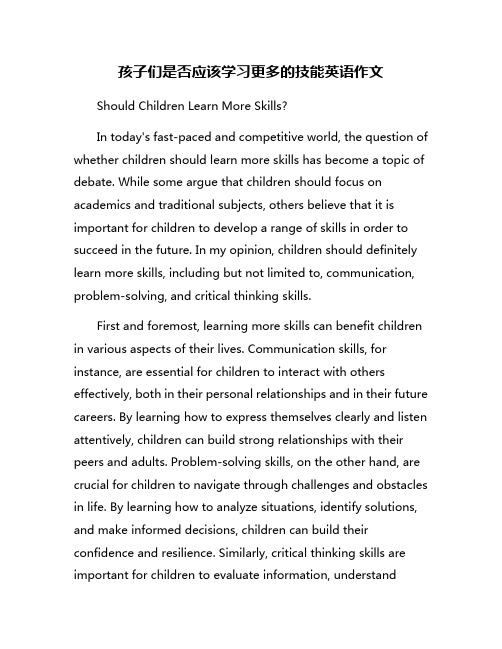
孩子们是否应该学习更多的技能英语作文Should Children Learn More Skills?In today's fast-paced and competitive world, the question of whether children should learn more skills has become a topic of debate. While some argue that children should focus on academics and traditional subjects, others believe that it is important for children to develop a range of skills in order to succeed in the future. In my opinion, children should definitely learn more skills, including but not limited to, communication, problem-solving, and critical thinking skills.First and foremost, learning more skills can benefit children in various aspects of their lives. Communication skills, for instance, are essential for children to interact with others effectively, both in their personal relationships and in their future careers. By learning how to express themselves clearly and listen attentively, children can build strong relationships with their peers and adults. Problem-solving skills, on the other hand, are crucial for children to navigate through challenges and obstacles in life. By learning how to analyze situations, identify solutions, and make informed decisions, children can build their confidence and resilience. Similarly, critical thinking skills are important for children to evaluate information, understandcomplex concepts, and make reasoned judgments. By learning how to think critically, children can develop their intellectual abilities and make wise choices.Furthermore, learning more skills can also help children to adapt to the demands of a rapidly changing world. In today's digital age, technology is constantly evolving, and new opportunities and challenges arise regularly. By learning a variety of skills, children can become more versatile and adaptable, and better equipped to thrive in a dynamic environment. For example, children who learn coding and programming skills can create their own websites, apps, and games, and potentially pursue careers in the technology sector. Similarly, children who learn creative skills such as drawing, painting, or writing can express themselves artistically and explore their talents. By developing a diverse range of skills, children can discover their passions, broaden their horizons, and unlock their potential.In conclusion, I believe that children should learn more skills in order to thrive in today's world. By acquiring communication, problem-solving, and critical thinking skills, children can effectively interact with others, overcome challenges, and think independently. By developing a diverse range of skills, children can adapt to a changing world and pursue their interests andpassions. Therefore, it is important for parents, educators, and policymakers to encourage children to learn and explore different skills, and provide them with opportunities to develop their talents and abilities. Ultimately, by investing in children's skills and abilities, we can prepare them for success in the future.。
英语作文 数学技能
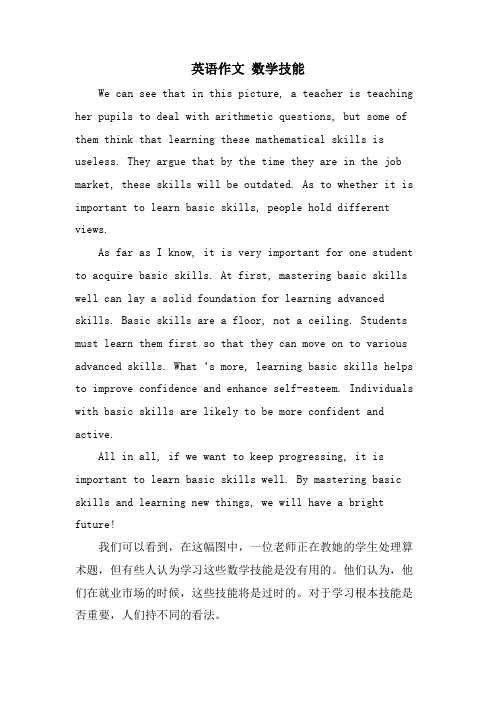
英语作文数学技能We can see that in this picture, a teacher is teaching her pupils to deal with arithmetic questions, but some of them think that learning these mathematical skills is useless. They argue that by the time they are in the job market, these skills will be outdated. As to whether it is important to learn basic skills, people hold different views.As far as I know, it is very important for one student to acquire basic skills. At first, mastering basic skills well can lay a solid foundation for learning advanced skills. Basic skills are a floor, not a ceiling. Students must learn them first so that they can move on to various advanced skills. What‘s more, learning basic skills helps to improve confidence and enhance self-esteem. Individuals with basic skills are likely to be more confident and active.All in all, if we want to keep progressing, it is important to learn basic skills well. By mastering basic skills and learning new things, we will have a bright future!我们可以看到,在这幅图中,一位老师正在教她的学生处理算术题,但有些人认为学习这些数学技能是没有用的。
- 1、下载文档前请自行甄别文档内容的完整性,平台不提供额外的编辑、内容补充、找答案等附加服务。
- 2、"仅部分预览"的文档,不可在线预览部分如存在完整性等问题,可反馈申请退款(可完整预览的文档不适用该条件!)。
- 3、如文档侵犯您的权益,请联系客服反馈,我们会尽快为您处理(人工客服工作时间:9:00-18:30)。
关于儿童算术能力childrens numerical skills
人似乎生来就会计算。
孩子们使用数字的技能发展得如此之早和如此必然,很容易让人想象有一个数学指导他们的成长成熟的内部时钟。
不久后,在学会走路和说话,他们就能以令人惊叹的准确表---为五个椅子各一把刀,一个汤匙,一把叉子。
很快,他们是他们什么都放在桌子上,并有点迟五刀,匙,叉能力,这对15把银餐具的数额。
如此这般地掌握了加法之后,他们又转向减法。
这似乎是合理的期待,如果一个孩子都出生在一个偏僻的荒岛和检索七年后,他或她可以直接上小学没有任何智力调整方面的严重问题一个二年级的数学课。
当然,事实并非如此简单。
本世纪认知心理学家的工作已经揭示了日常学习的智力发展所依赖的微妙形式。
他们观察到孩子们缓慢掌握-----或视情况而定成-----成年人数量概念,采取颠簸,是不变的水从一个人到一个高高瘦瘦的短切玻璃盆满钵满。
心理学家曾展示年幼的孩子,们数一堆铅笔,随时报告的蓝色或红色的铅笔数量,但必须出总的哄骗。
此类研究表明:数学基础是经过逐渐掌握,并与努力。
他们还建议,抽象的数字的概念------一个单一性的想法,
一二重性,一threeness,适用于任何对象的类,是做什么了数学比设置一个表要求的前提-----从先天本身远。
